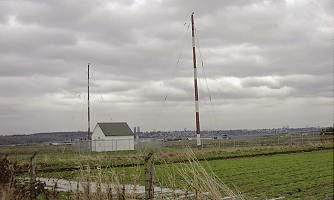 Hunting For NDB’s In CLE191
Hunting For NDB’s In CLE191
 |
| One CLE Target - 'VR' 266KHz / Vancouver Int'l Approach |
How time flies. For you low-frequency buffs, another challenge awaits. From CLE coordinator Brian Keyte (G3SIA) comes the following reminder:
"Our February Co-ordinated Listening Event will soon be here.
We'll be hunting for normal beacons in two contrasting frequency ranges.
One range also gives the possibility of hearing several amateur beacons.
As always, first-time CLE logs will be extra welcome.
Days: Friday 20 February - Monday 23 February
Times: Start and end at midday, your local time
Frequencies: 260.0 - 269.9 kHz
plus: 440.0 - 1740.0 kHz
Many of us should be able to hear beacons in both ranges, though Europe
only has a handful in the '260s'. From 440 onwards, Eastern Europe and
North Africa have several beacons and some regular UNIDs and some NDBs
can be found among Europe's Medium Wave Broadcast Stations.
Many of us are within range of some of the amateur beacons on frequencies around 470 kHz and 500 kHz - we'll be listening for ANYTHING OPERATING IN BEACON MODE, preferably with normal speed Morse.
(We ask operators who sometimes use QRSS, PSK, WSPR, etc., which need
software to receive them, to PLEASE CHOOSE THE SIMPLER MODE during
the CLE so that we shall all be able to receive and report them).
Send your CLE log to the List, preferably as a plain text email
and not in an attachment, with CLE191 at the start of its title.
Please show on EVERY LINE of your log:
# The full Date (or Day no.) and UTC (the day changes at 00:00 UTC).
# kHz (the beacon's nominal published frequency, if you know it)
# The Call Ident.
Other optional details, Location, Distance, etc., go LATER in the same
line (or in footnotes). Any extra details about UNIDs, especially strong
ones that may be near to you (maybe their approximate direction, etc.)
will help us to discover more about them. As always, please make your
log useful to old and new members alike by including your own location
and brief details of the equipment and aerial(s) you were using.
I will send an 'Any More Logs?' email at about 18:00 UTC on Tuesday
evening. From it you can check that your log has been found OK.
Do make sure that your log has arrived at the very latest by 09:00 UTC
on Wednesday 25 February.
I hope to finish making the combined results on that day."
These listening events serve several purposes. They:
- determine, worldwide, which beacons are actually in service and on-the-air so the online database can be kept up-to-date
- determine, worldwide, which beacons are out-of-service or have gone silent since the last CLE covering this range
- will indicate the state of propagation conditions at the various participant locations
- will give you an indication of how well your LF/MF receiving system is working
- give participants a fun yet challenging activity to keep their listening skills honed
Final details can be found at the NDB List website, and worldwide results, for every participant, will be posted there a few days after the event. If you are a member of the ndblist Group, results will also be e-mailed and posted there.
The very active Yahoo ndblist Group is a great place to learn more about the 'Art of NDB DXing' or to meet other listeners in your region. There is a lot of good information available there and new members are always very welcome.
If you are contemplating getting started on 630m, listening for NDBs is an excellent way to test out your receive capabilities as there are several NDBs located near this part of the spectrum.
You need not be an ndblist member to participate in the CLEs and all reports, no matter how small, are of much value to the organizers. 'First-time' logs are always VERY welcome!
Reports may be sent to the ndblist or e-mailed to either myself or CLE co- ordinator, Brian Keyte (G3SIA), whose address appears above.
Please...do give the CLE a try....then let us know what NDB's can be heard from your location! Your report can then be added to the worldwide database to help keep it up-to-date.













